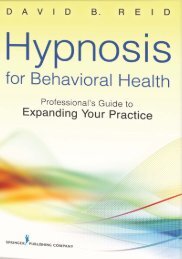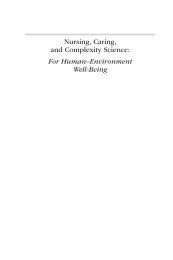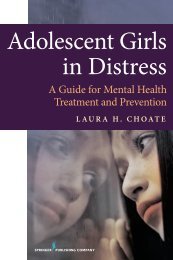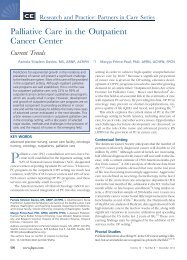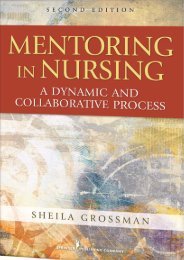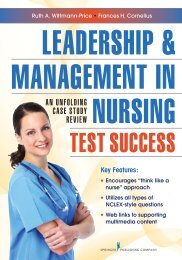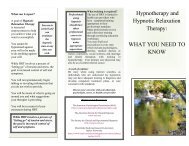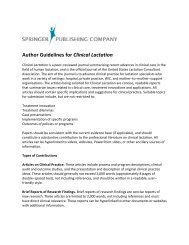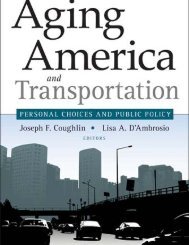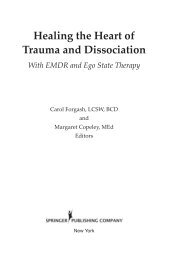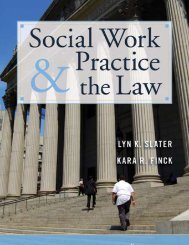Expertise in nursing practice : caring, clinical judgment - Springer ...
Expertise in nursing practice : caring, clinical judgment - Springer ...
Expertise in nursing practice : caring, clinical judgment - Springer ...
You also want an ePaper? Increase the reach of your titles
YUMPU automatically turns print PDFs into web optimized ePapers that Google loves.
Introduction xix<br />
The Dreyfus model does not view the novice as a “failed” or deficient<br />
practitioner but rather as an entrant <strong>in</strong>to a new field that, like all human<br />
be<strong>in</strong>gs, cannot be beyond experience and practical knowledge. A student<br />
can be the best novice learner ever, or at least engaged, conscientious, and<br />
diligent, prepared <strong>in</strong> the necessary science and theory background, and<br />
be considered “do<strong>in</strong>g well” for his level of experience. One way of th<strong>in</strong>k<strong>in</strong>g<br />
about the novice stage is to recognize the extent to which this stage of skill<br />
acquisition reveals the complexities of the practical cl<strong>in</strong>ical knowledge<br />
embedded <strong>in</strong> a particular cl<strong>in</strong>ical field such as nurs<strong>in</strong>g or medic<strong>in</strong>e.<br />
No one could have predicted the response of practic<strong>in</strong>g nurses all<br />
over the world to that account of ga<strong>in</strong><strong>in</strong>g cl<strong>in</strong>ical expertise, and the<br />
articulation of the doma<strong>in</strong>s of nurs<strong>in</strong>g <strong>practice</strong>. From Novice to Expert<br />
has been translated <strong>in</strong>to F<strong>in</strong>nish, German, Japanese, Spanish, French,<br />
Danish, Swedish, Russian, Dutch and Portuguese.<br />
From Novice to Expert and <strong>Expertise</strong> <strong>in</strong> Nurs<strong>in</strong>g Practice have been<br />
the source of many conferences and nurs<strong>in</strong>g curricula as well as the basis<br />
for cl<strong>in</strong>ical promotion programs <strong>in</strong> many hospitals <strong>in</strong> many parts of the<br />
world. Nurses commented that From Novice to Expert and <strong>Expertise</strong><br />
<strong>in</strong> Nurs<strong>in</strong>g Practice put <strong>in</strong>to words what they had always known about<br />
their cl<strong>in</strong>ical nurs<strong>in</strong>g expertise but had difficulty articulat<strong>in</strong>g.<br />
We believe that <strong>Expertise</strong> <strong>in</strong> Nurs<strong>in</strong>g Practice illum<strong>in</strong>ates and extends<br />
the project begun <strong>in</strong> From Novice to Expert (1984, 2000) with a few<br />
changes and many additional nuances. <strong>Expertise</strong> <strong>in</strong> Nurs<strong>in</strong>g Practice provides<br />
a much thicker description of the acquisition of cl<strong>in</strong>ical expertise and<br />
a much more extended exam<strong>in</strong>ation of the nature of cl<strong>in</strong>ical knowledge,<br />
cl<strong>in</strong>ical <strong>in</strong>quiry, cl<strong>in</strong>ical <strong>judgment</strong>, and expert ethical comportment. This<br />
book is based on a 6-year study of 130 hospital nurses, most of them critical<br />
care nurses. In this study, we found that exam<strong>in</strong><strong>in</strong>g the nature of the<br />
nurse’s agency, by which we mean the sense and possibilities for act<strong>in</strong>g <strong>in</strong><br />
particular cl<strong>in</strong>ical situations, gave new <strong>in</strong>sights about how perception and<br />
action are both shaped by a <strong>practice</strong> community. We came to more clearly<br />
understand the dist<strong>in</strong>ctions between engagement with a problem or situation<br />
and the requisite nurs<strong>in</strong>g skills of <strong>in</strong>volvement with patients and families.<br />
These existential skills of <strong>in</strong>volvement—know<strong>in</strong>g how close or distant<br />
to be with patients and families <strong>in</strong> critical times of threat and recovery—<br />
are learned over time experientially. Indeed, we will make the claim that<br />
the skill of <strong>in</strong>volvement with patients and families seem to be central <strong>in</strong><br />
ga<strong>in</strong><strong>in</strong>g nurs<strong>in</strong>g expertise, because promot<strong>in</strong>g the well-be<strong>in</strong>g of vulnerable<br />
others requires both problem engagement and the existential skills<br />
of personal <strong>in</strong>volvement. In this study, we came to see the <strong>in</strong>terl<strong>in</strong>kage of



